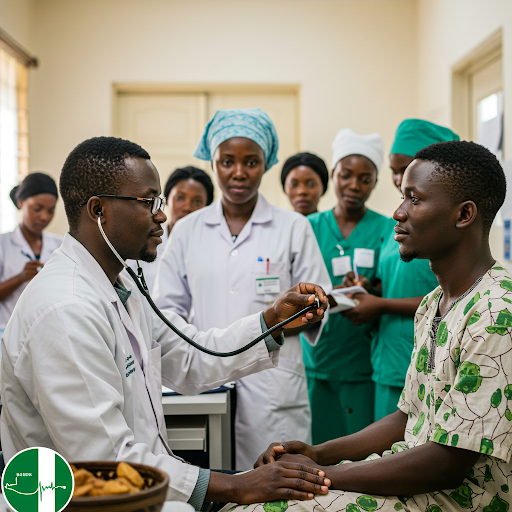By Victor Benjamin, West / South South Director, YP4T

Health is wealth,” a common adage echoing through Nigerian communities, encapsulates the fundamental importance of well-being. President Bola Ahmed Tinubu‘s administration appears to have taken this sentiment to heart, demonstrating a bold commitment to revolutionising Nigeria’s health sector. Through a multi-pronged approach focused on strengthening infrastructure, upskilling manpower, and ensuring efficient healthcare delivery, the administration is signalling a new era for healthcare in Nigeria. This ambitious agenda, backed by tangible initiatives and achievements, holds the promise of a healthier and more prosperous nation.
President Bola Ahmed Tinubu’s administration has launched a comprehensive and ambitious agenda to transform Nigeria’s healthcare sector, signaling a new era of progress and commitment to the well-being of the Nigerian people. This multi-pronged approach focuses on strengthening infrastructure, upskilling the healthcare workforce, enhancing system efficiency, and addressing critical public health challenges. The administration’s actions are demonstrably moving towards a more robust and accessible healthcare system.
A cornerstone of this transformation is the aggressive expansion and upgrade of healthcare infrastructure. The federal government’s decisive action to convert the General Hospital Kumo in Gombe State into a Federal Medical Centre (FMC) is a prime example. This strategic upgrade, the second federal medical institution in Gombe, will significantly improve healthcare delivery in the Northeast region. Moreover, the upgraded Kumo FMC will serve as a teaching hospital for the Federal University of Kashere and Lincoln University, Kumo, contributing to the crucial training of future medical practitioners.
Furthermore, the administration is committed to dramatically increasing the number of functional Primary Healthcare Centres (PHCs) from 8,809 to over 17,600 by 2027. This expansion aims to bring quality healthcare closer to communities, particularly in underserved areas. To support this, the Basic Health Care Provision Fund (BHCPF) is being redesigned to provide more Direct Facility Funding to healthcare facilities, increasing from N300,000 to N600,000-N800,000 per quarter. The federal government has also identified 577 primary healthcare centres for immediate revitalization, indicating a focused and actionable plan.
Recognising that a strong healthcare system relies on a skilled workforce, President Tinubu has prioritised investment in human resources for health. The approval of 774 National Health Fellows, selected from each local council, aims to foster sustained improvements and cultivate future healthcare leaders. The administration has also set out to train 120,000 frontline health workers over 16 months, with 40,240 already trained, addressing critical manpower gaps in PHCs. Additionally, the enrolment capacity of accredited nursing and midwifery institutions is being increased to meet the growing demand for healthcare professionals. A community health programme is being redesigned to create 126,000 jobs for community health workers, extending essential health services to remote and underserved communities.
Also Read: AI to Add $15 Billion to Nigeria’s Economy – And Young Nigerians Will Lead the Charge
Strengthening healthcare systems and efficiency is another critical aspect of the administration’s agenda. The Nigeria Health Sector Renewal Investment Initiative (NHSRII), launched in December 2023, serves as a strategic blueprint to improve population health outcomes through primary healthcare and enhance reproductive, maternal, and child health services. The National Primary Health Care Development Agency (NPHCDA) is developing a three-year digitalisation agenda, encompassing facility functionality, supply chain management, financial management, and the community health information system. This initiative promises improved efficiency and data-driven decision-making. Nigeria’s active participation in the Collaborative Active Strategy (CAS) further streamlines health campaigns and strengthens the overall health system.
Addressing critical health challenges is also a priority. First Lady Senator Oluremi Tinubu’s strong advocacy campaign against tuberculosis (TB), declaring it a health emergency and committing an additional N1 billion through the Renewed Hope Initiative, highlights the administration’s focus on tackling significant public health issues. The nationwide rollout of HPV vaccination, with over 12 million girls vaccinated, demonstrates a proactive approach to preventive healthcare.
The international community has recognised the administration’s commitment. The World Bank has approved $1.57 billion to support the health sector in Nigeria, focusing on strengthening human capital through better health for women, children, and adolescents. This significant financial support underscores the global confidence in the administration’s vision and execution.
President Tinubu’s comprehensive health agenda promises substantial benefits for the Nigerian populace. Foremost, it aims to drastically improve access to quality healthcare, particularly at the primary level, ensuring that even remote communities receive essential medical services. This is complemented by a concerted effort to build a more robust and better-trained healthcare workforce, effectively addressing critical manpower shortages and ensuring adequate staffing across facilities. Simultaneously, the administration is focusing on strengthening healthcare infrastructure and equipment, upgrading existing facilities and constructing new ones to provide healthcare providers with necessary resources.
Furthermore, the agenda prioritises the creation of more efficient and transparent healthcare systems through digitalisation and improved financial management, streamlining processes and optimising resource allocation. Crucially, it demonstrates a strong commitment to tackling critical public health issues, such as tuberculosis and immunisation, through focused attention and targeted interventions. These multifaceted efforts collectively pave the way for a healthier nation, enhancing the overall well-being of the Nigerian people.
This comprehensive approach underscores President Tinubu’s understanding of the critical role of a strong healthcare system in national development. By prioritizing infrastructure, workforce development, system efficiency, and targeted interventions, the administration is laying the foundation for a healthier and more prosperous Nigeria. This narrative presents a compelling story of progress and commitment in the Nigerian health sector, marking a significant step towards a brighter future for the nation’s healthcare.



